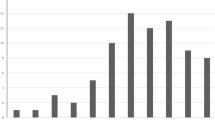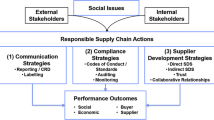Abstract
Drawing on theoretical assumptions from equity theory applied to exchange situations between businesses, and justice concepts applied to supply chains, this work has the original objective of discussing the level of implementation of social aspects of operations management by focusing on inter-organizational justice in Brazilian’s supply chains. In this context, this research presents a quantitative survey study, in which managers of Brazilian companies answered a questionnaire on their perceptions of levels of adoption of practices/initiatives for justice in supply chains. The results indicate that: (a) most of the analyzed practices have potential to be adopted in a more intense way, revealing potential actions that managers should take in order to promote social justice over the supply chain; (b) there are many positive correlations among the analyzed practices, which may suggest potential relationships, revealing practices that could have a joint implementation. Other results, implications, and research limitations were equally presented by taking into account particularities of Brazilian national culture.

Similar content being viewed by others
References
Ageron, B., Gunasekaran, A., & Spalanzani, A. (2012). Sustainable supply management: An empirical study. International Journal of Production Economics, 140(1), 168–182.
Ahi, P., & Searcy, C. (2015a). An analysis of metrics used to measure performance in green and sustainable supply chains. Journal of Cleaner Production, 86, 360–377.
Ahi, P., & Searcy, C. (2015b). Measuring social issues in sustainable supply chains. Measuring Business Excellence, 19(1), 33–45.
Ahi, P., & Searcy, C. (2015c). Assessing sustainability in the supply chain: A triple bottom line approach. Applied Mathematical Modelling, 39(10/11), 2882–2896.
Azevedo, S. G., Carvalho, H., & Cruz, M. V. (2011). The influence of green practices on supply chain performance: A case study approach. Transportation Research Part E, 47, 850–871.
Burton, E. (2000). The compact city: Just or just compact? A preliminary analysis. Urban Studies, 37(11), 1969–2006.
Carter, C. R., & Rogers, D. S. (2008). A framework of sustainable supply chain management: moving toward new theory. International Journal of Physical Distribution and Logistics Management, 38(5), 360–387.
Chu, R. A., & Wood, T, Jr. (2008). Brazilian cultural organization in post-globalization: Global or local? Revista de Administração Pública, 42(5), 969–91.
Colquitt, J. A., Wesson, M. J., Porter, C. O. L. H., Conlon, D. E., & Ng, K. Y. (2001). Justice at the millennium: A meta-analytic review of 25 years of organizational justice research. Journal of Applied Psychology, 86(3), 425–445.
Dagnino, R., & Velho, L. (1998). University-industry-government relations on the periphery: The University of Campinas, Brazil. Minerva, 36(3), 229–251.
Dant, R. P., Perrigot, R., & Cliquet, G. (2008). A cross-cultural comparison of the plural forms in franchise networks: United States, France, and Brazil. Journal of Small Business Management, 46(2), 286–311.
Davidson, K. M. (2011). Reporting systems for sustainability: What are they measuring? Social Indicators Research, 100(2), 351–365.
Dubey, R., Gunasekaran, A., Childe, S. J., Papadopoulos, T., Hazen, B., Giannakis, M., et al. (2017). Examining the effect of external pressures and organizational culture on shaping performance measurement systems (PMS) for sustainability benchmarking: Some empirical findings. International Journal of Production Economics, 193, 63–76.
Duncan, W. J., & Feisal, J. P. (1989). No laughing matter: Patterns of humor in the workplace. Organizational Dynamics, 17(4), 18–30.
Dyllick, T., & Hockerts, K. (2002). Beyond the business case for corporate sustainability. Business Strategy and the Environment, 11(2), 130–141.
Echegaray, F. (2013). Sustainability in Brazil: A mixed conundrum. The Guardian, Wednesday 13 March 2013. http://www.theguardian.com/sustainable-business/sustainability-brazil-mixed-conundrum.
Ehnert, I. (2009). Sustainability and human resource management: Reasoning and applications on corporate websites. European Journal of International Management, 3(4), 419–438.
Fahimnia, B., Sarkis, J., & Davarzani, H. (2015). Green supply chain management: A review and bibliometric analysis. International Journal of Production Economics, 162, 101–114.
Found, P. (2013). Lean supply chains: A behavioral perspective: Examples from packaging supply chains in the FMCG sector. In I. Giannoccaro (Ed.), Behavioral Issues in Operations Management. London: Springer.
Ghalib, A. K., & Agupusi, P. (2014). Business strategy and corporate responsibility: Perception and practice in the oil industry and the role of non-governmental organisations. Journal of Business Economics and Management, 15(5), 951–963.
Ghisi, F. A., da Silveira, J. A. G., Kristensen, T., Martin, H., & Lindgreen, A. (2008). Horizontal alliances amongst small retailers in Brazil. British Food Journal, 110(4/5), 514–538.
Govindan, K., Sarkis, J., Jabbour, C. J., Zhu, Q., & Geng, Y. (2014). Eco-efficiency based green supply chain management: Current status and opportunities. European Journal of Operational Research, 233(2), 293–298.
Griffith, D. A., Harvey, M. G., & Lusch, R. F. (2006a). Social exchange in supply chain relationships: The resulting benefits of procedural and distributive justice. Journal of Operations Management, 24(2), 5–98.
Griffith, D. A., Myers, M. B., & Harvey, M. G. (2006b). An investigation of national culture’s influence on relationship and knowledge resources in interorganizational relationships between Japan and the United States. Journal of International Marketing, 14(3), 1–32.
Gunasekaran, A., & Irani, Z. (2014). Sustainable operations management: Design, modelling and analysis. Journal of the Operational Research Society, 65(6), 801–805.
Gunasekaran, A., Jabbour, C. J. C., & de Jabbour, A. B. L. (2014). Managing organizations for sustainable development in emerging countries: An introduction. International Journal of Sustainable Development & World Ecology, 21, 195–197.
Gurtu, A., Searcy, C., & Jaber, M. Y. (2015). An analysis of keywords used in the literature on green supply chain management. Management Research Review, 38(2), 166–194.
Hair, J. F, Jr., Anderson, R. E., Tatham, R. L., & Black, W. C. (2005). Análise multivariada de dados (5th ed.). Porto Alegre: Bookman.
Hall, J., Matos, S., Severino, L., & Beltrão, N. (2009). Brazilian biofuels and social exclusion: Established and concentrated ethanol versus emerging and dispersed biodiesel. Journal of Cleaner Production, 17, 77–85.
Hilal, A. V. G. (2006). Brazilian national culture, organizational culture and cultural agreement: Findings from a multinational company. International Journal of Cross Cultural Management, 6(2), 139–167.
Huppertz, J. W., Arenson, S. J., & Evans, R. H. (1978). An application of equity theory to buyer-seller exchange situations. Journal of Marketing Research, 250–260.
Huq, F. A., Stevenson, M., & Zorzini, M. (2014). Social sustainability in developing country suppliers: An exploratory study in the readymade garments industry of Bangladesh. International Journal of Operations & Production Management, 34(5), 610–638.
Islam, G. (2012). Can the subaltern eat? Anthropophagic culture as a Brazilian lens on post-colonial theory. Organization, 19(2), 159–180.
Jabbour, C. J. C., de Sousa Jabbour, A. B. L., Govindan, K., De Freitas, T. P., Soubihia, D. F., Kannan, D., et al. (2016). Barriers to the adoption of green operational practices at Brazilian companies: Effects on green and operational performance. International Journal of Production Research, 54(10), 3042–3058.
Jap, S. D. (2001). Pie sharing’ in complex collaboration contexts. Journal of Marketing Research, 38(1), 86–99.
Ketkar, S., Kock, N., Parente, R., & Verville, J. (2012). The impact of individualism on buyer–supplier relationship norms, trust and market performance: An analysis of data from Brazil and the USA. International Business Review, 21(5), 782–793.
Kopczak, L. R., & Johnson, M. E. (2003). The supply-chain management effect. MIT Sloan Management Review, 44(3), 27–34.
Kozlowski, A., Searcy, C., & Bardecki, M. (2015). Corporate sustainability reporting in the apparel industry: An analysis of indicators disclosed. International Journal of Productivity and Performance Management, 64(3), 377–397.
Lambert, D. M., & Cooper, M. C. (2000). Issues in supply chain management. Industrial Marketing Management, 29(1), 65–83.
Lind, E. A., & Tyler, T. R. (1988). The social psychology of procedural justice. New York, NY: Plenum Press.
Liu, Y., Huang, Y., Luo, Y., & Zhao, Y. (2012). How does justice matter in achieving buyer-supplier relationship performance? Journal of Operations Management, 30(5), 355–367.
Lu, R. X., Lee, P. K., & Cheng, T. C. E. (2012). Socially responsible supplier development: Construct development and measurement validation. International Journal of Production Economics, 140(1), 160–167.
Luo, Y. (2007). The independent and interactive roles of procedural, distributive, and interactional justice in strategic alliances. Academy of Management Journal, 50(3), 644–664.
Mani, V., Agarwal, R., Gunasekaran, A., Papadopoulos, T., Dubey, R., & Childe, S. J. (2016a). Social sustainability in the supply chain: Construct development and measurement validation. Ecological Indicators, 71, 270–279.
Mani, V., Gunasekaran, A., Papadopoulos, T., Hazen, B., & Dubey, R. (2016b). Supply chain social sustainability for developing nations: Evidence from India. Resources, Conservation and Recycling, 111, 42–52.
Messick, D., & Cook, K. (1983). Equity theory: psychological and sociological perspectives. New York, NY: Praeger.
Narasimhan, R., Narayanan, S., & Srinivasan, R. (2013). An investigation of justice in supply chain relationships and their performance impact. Journal of Operations Management, 31(5), 236–247.
O’Neill, P., Sohal, A., & Teng, C. W. (2016). Quality management approaches and their impact on firmsx financial performance—An Australian study. International Journal of Production Economics, 171, 381–393.
Pagell, M., & Shevchenko, A. (2014). Why research in sustainable supply chain management should have no future. Journal of Supply Chain Management, 50(1), 44–55.
Paillé, P., Chen, Y., Boiral, O., & Jin, J. (2014). The impact of human resource management on environmental performance: An employee-level study. Journal of Business Ethics, 121(3), 451–466.
Pires, S. R. (2015). The current state of supply chain management in Brazil. In Supply chain design and management for emerging markets (pp. 39–63). Springer International Publishing.
Sarkis, J. (2012). Models for compassionate operations. International Journal of Production Economics, 139(2), 359–365.
Scheer, L. K., Kumar, N., & Steenkamp, J. B. E. (2003). Reactions to perceived inequity in US and Dutch interorganizational relationships. Academy of Management Journal, 46(3), 303–316.
Scherlen, A., & Robinson, M. (2008). Open access to criminal justice scholarship: A matter of social justice. Journal of Criminal Justice Education, 19(1), 54–74.
Segovia-San-Juan, A. I., Saavedra, I., & Fernández-de-Tejada, V. (2015). Analyzing disability in socially responsible companies. Social Indicators Research, 1–29.
Sun, S.-Y., Chao, P.-J. & Wu, C.-Y. (2009). A study on the satisfaction of supply chain management system from the view of justice and value. In Proceedings of the international conference on electronic business (ICEB), pp. 864–874.
Thürer, M., Godinho Filho, M., Stevenson, M., & Fredendall, L. D. (2013). Competitive priorities of small manufacturers in Brazil. Industrial Management & Data Systems, 113(6), 856–874.
Touboulic, A., & Walker, H. (2015). Theories in sustainable supply chain management: A structured literature review. International Journal of Physical Distribution & Logistics Management, 45(1/2), 16–42.
Ueltschy, L. C., Ueltschy, M. L., & Fachinelli, A. C. (2007). The impact of culture on the generation of trust in global supply chain relationships. Marketing Management Journal, 17(1), 15–26.
Walker, P. H., Seuring, P. S., Sarkis, P. J., & Klassen, P. R. (2014). Sustainable operations management: Recent trends and future directions. International Journal of Operations & Production Management, 34(5), 1–4.
Acknowledgements
Funding was provided by Conselho Nacional de Desenvolvimento Científico e Tecnológico (Grant PIBIC).
Author information
Authors and Affiliations
Corresponding author
Rights and permissions
About this article
Cite this article
Jabbour, C.J.C., Janeiro, R.C., de Sousa Jabbour, A.B.L. et al. Social aspects of sustainable supply chains: unveiling potential relationships in the Brazilian context. Ann Oper Res 290, 327–341 (2020). https://doi.org/10.1007/s10479-017-2660-7
Published:
Issue Date:
DOI: https://doi.org/10.1007/s10479-017-2660-7




